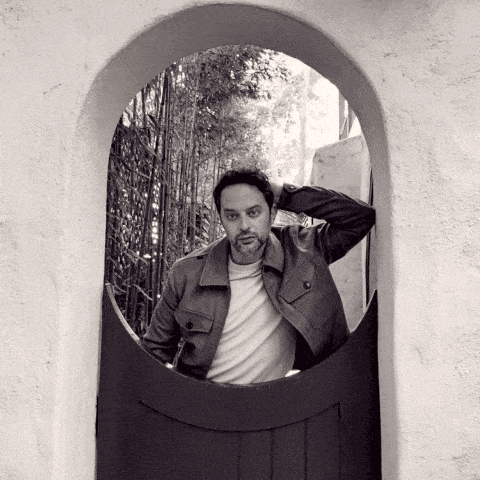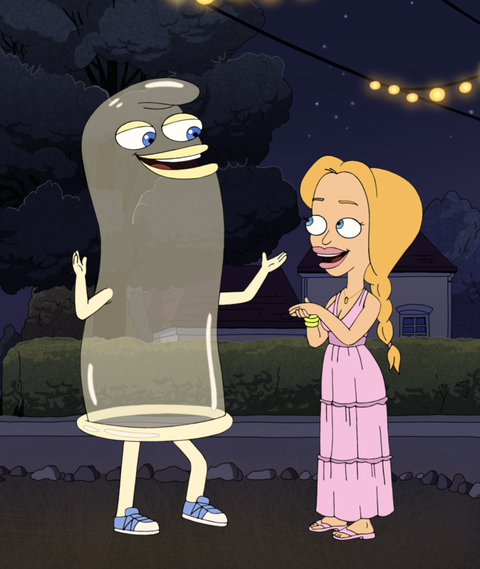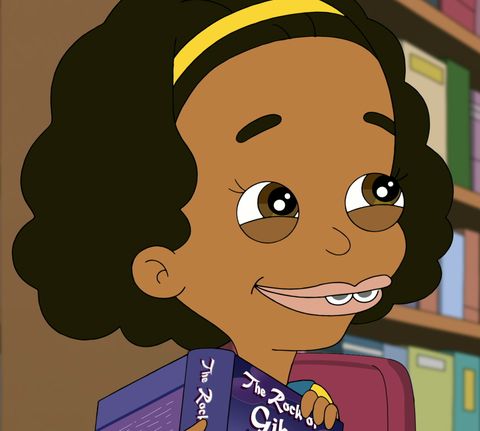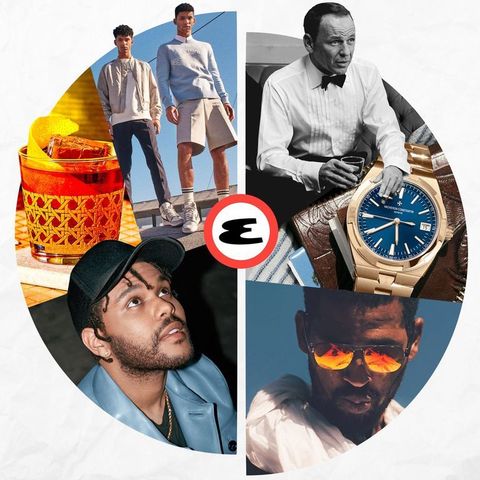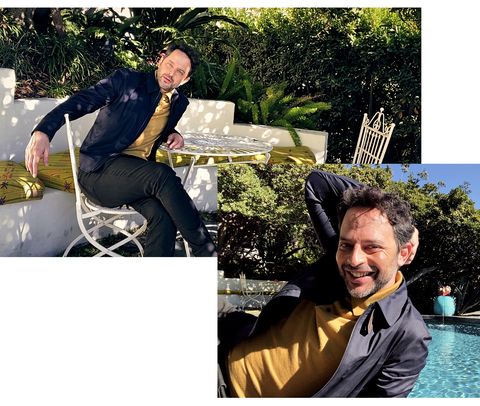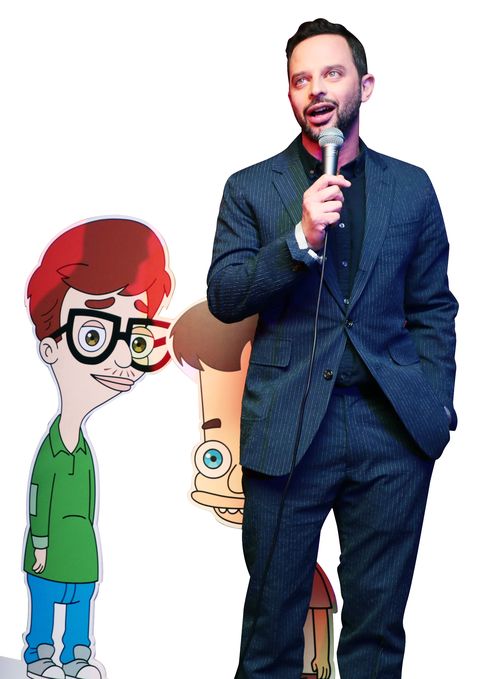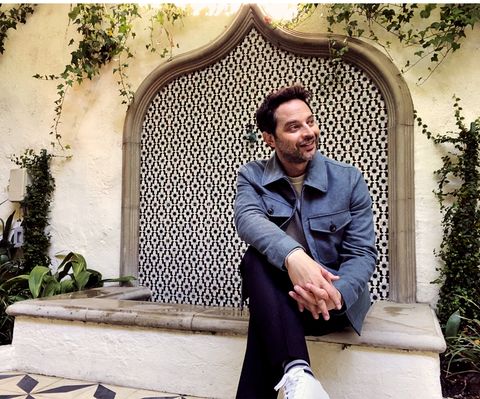Nick Kroll is talking with me about the end of the world over Zoom late one November night when he realizes something. He quietly stands up from his computer and maintains his focus on our conversation as he slowly walks across the room of his Los Feliz home to turn off the bathroom light behind him, where his toilet had been very visible in the background behind him. He returns to the chair with a straight face and without acknowledging that anything happened, mirroring the sort of joke that might appear on his Netflix animated series Big Mouth. For Kroll, today and throughout his career, the business of being funny can be a serious one too, toilet humor and all.
This type of humor (and the compassionate acknowledgement of one’s own flaws) is the heart of Big Mouth and its new season, which drops today on the streaming service. In the final stretch of Season Four, we’re reunited to our protagonist Nick Birch’s future self, Nick Starr (both voiced by Kroll), during a timely apocalyptic episode. “He’s a lonely 40-something-year-old game show host, very far from me,” Kroll deadpans. “I’ve never hosted a game show—mainly because I’ve never been offered one. But [with Nick Starr,] I was touching on the anxiousness and fear that I have experienced as I’ve gotten older and faced some of the realities of my own life that were, to be frank, pretty vulnerable to reveal to the room, and then to voice, and then to think about being out in the world.”
For Kroll, it’s not enough to simply hold the mirror up to our collective adolescent anxieties, it seems; he’s also giddied at the thought of magnifying his own shit, too. Big Mouth is a beloved animated puberty parable neatly trussed as a raunchy, fantastical comedy with a supporting cast of Hormone Monsters, a Shame Wizard, and the ghost of Duke Ellington. In the world of Big Mouth, our flaws and fears live among Kroll’s own as pimples, sex pillows, and periods personified. “Netflix has given us a tremendously long leash,” he says. “So we’ve had to create our own… parameters.”
Today Kroll, who turned 42 this summer, is neatly scruffy and sporting a slightly fraying “I Voted!” sticker a couple of weeks after Election Day (“I’ve definitely changed clothes since,” he jokes). Recently, he bought a new house and has been sharpening his kitchen skills, tapping into the New York Times Cooking app to master dishes like shakshuka, which he recently cooked for a (distanced and outdoor) brunch with Momofuku chef David Chang and his family.
“It feels like we made Season Four so long ago, but with distance, I’m like, ‘I really love this,’” he says. “It’s felt weird to choose to do anything else. Why would I choose to make something else a priority over this show that, obviously, has my name on it, and is about me?”
Though the animated show has never shied away from getting real—tackling modern-day pre-pubescent concerns like code-switching, body odor, divorce, and popularity—its new season takes the wildest, most personal swings yet. It’s a tricky balancing act to find a middle ground between laugh-out-loud 9/11 jokes (with a punchline you won’t see coming) and ten episodes that focus on stress, self-doubt, and the inner saboteurs that live within each of us. But “because the show is about change, it doesn’t feel like we’re constantly revisiting the same jokes for people,” Kroll says. “Our characters can learn things and actually evolve.”
Though Kroll has evolved over the course of Big Mouth’s run, too. “My personal barometer is: it always has to be funny, or it feels preachy,” he says of tackling the challenges the show faced. “But it can never be funny at the expense of being clear about who the target is, and what the joke is that we’re telling.” And this year, that fine line moved further than it ever had before.
Though he’s known by many for breakout roles including the rolodex of horrifically amusing characters he played on his eponymous Comedy Central series The Kroll Show and shock jock/secret intellectual Howard “The Douche” Tuttelman on Parks and Recreation, Big Mouth turned Kroll into a household name when it premiered in 2017. Voicing Nick Birch, Kroll has spent the past four years mining his own life for storylines alongside a voice cast that includes top-tier talent like John Mulaney, Maya Rudolph, Fred Armisen, and Jordan Peele. Kroll appears most frequently, as our protagonist but also as Maurice the Hormone Monster, Coach Steve, Lola Skump, a tart-mouthed ladybug, Sylvester Stallone, and many, many more.
“Working in animation is very different from being an actor for hire,” he says. “But if you’re constantly thinking about character and story for animation, your brain is warmer to that and can inform your performance. When you’re just an actor for hire, you remember what that feels like. And when you go back to your show, it reminds what it’s like for someone who’s just coming in to do one thing.”
Fans flocked to Big Mouth like a watering hole in a desert (though Netflix does not release viewership stats, a renewal through Season Six and an upcoming spinoff both speak to the show’s overwhelming popularity). Critics loved it too, finding the show equally as funny as it is insightful (perhaps shockingly for a cartoon in which a literal constipation is voiced by Academy Award nominee Paul Giamatti) about the shared experience of growing up. “Laughing from the diaphragm at Big Mouth is like barking out a catharsis,” The New Yorker wrote of the show’s first season in 2017. Last fall, The Atlantic’s Hannah Giorgis wrote, “Big Mouth retains its characteristically goofy and surreal elements, while making the insightful case that groups such as Men 4 Equality are often motivated by overlapping forms of hatred toward marginalized groups.”
“There was an early review of the show that basically said, ‘Big Mouth gives zero fucks,’” Kroll remembers. “We have tried to maintain that mantra as time has gone on, to just remember that part of the recipe for our success has been really going for it and not trying to play too safe. We’ve found the crazier the jokes, the more we’re allowed to have bigger emotional moments—and the more [of those] bigger emotional moments, the more we’re afforded the ability to make really insane, huge, hard jokes.”
Season Four features winking third-wall breaking, an unofficial crossover episode with Hulu hit PEN15, star-studded new voices (provided by Sterling K. Brown, Seth Rogen, Maria Bamford, Lena Waithe, and John Oliver), and a storyline so perfectly timed you’d think Kroll was psychic. Because Big Mouth starts breaking its seasons nearly two years before they premiere, any overlap between its 10-episode arc about anxiety and the world’s growing cloud of stress and fatigue—induced by a combination of the ongoing pandemic, political turmoil, civil unrest, and *gestures around wildly*—is mostly coincidental. “We knew that there would be the general election, and we figured that there might be a heightened level of anxiety around that,” he says with a knowing grin. “It proved to be true. We did not foresee a global pandemic, so what an added bonus for us, and what a tremendous bummer for the world.”
But the pandemic would not be alone in informing the course of Big Mouth’s future. In May, George Floyd was killed by Minneapolis police. At the time, the show was on the cusp of locking its final edit; little could be done to meet the moment with the clock ticking, but Kroll knew not changing with the times would feel completely out of sync with the show itself. In June, as protestors marched for justice across the country, actress and comedian Jenny Slate, a white woman, reached out to Kroll to step down from her role as the biracial character Missy Foreman-Greenwald.
“I have come to the decision today that I can no longer play the character of Missy on the animated TV show Big Mouth,” Slate said in an Instagram post. “At the start of the show, I reasoned with myself that it was permissible for me to play Missy because her mom is Jewish and white—as am I. But Missy is also Black, and Black characters on an animated show should be played by Black people.”
Following Slate’s announcement, Kroll and his Big Mouth team began recasting. “We searched high and low,” he remembers. “We entertained a ton of voice talent in Hollywood, but also if people submitted tapes to us on Twitter or Instagram, we listened.”
Though the final rounds of casting included both a mixture of self-submissions and also some name-brand voice talent, Ayo Edebiri—a writer on the show’s in-progress fifth season, who auditioned just like the other candidates did—landed the role in late August (she makes her first, wonderful appearance towards the end of the season). “It ended up being a very natural transition for us creatively,” Kroll says. “She was very familiar with the show, and really was Missy when she was a kid. When you see a picture of her as a 13-year-old, it’s like staring at a live-action Missy.”
Throughout our conversation, Kroll is happy (and quick) to steer things to uncomfortable topics he (correctly) predicts we’ll want to go, but once there, there’s no pretense, trickery, or PR-approved-and-rehearsed spin that masks the truth. He’s taking us there because he knows we’ll ask about the hiccups, and he’d prefer to be the one to zig before we zag. For Kroll, it’s about ownership, and a willingness to concede that though his voice may be loudest, it’s by no means the only voice in the room, nor is it even the best voice when it comes to the show’s non-cisgender heterosexual white male storylines.
“We do our best to bring in our writers not to just purely do what we say, but to have a real honest, ongoing conversation about not only the storylines, and not only the characters, but how those characters function inside of these stories,” Kroll says. “I would never put words in their mouth and say, ‘We run it perfectly!’ But I think we do our best to not get defensive, to say, does this make sense? Does this work? If it does, great. If it doesn’t, then let’s talk about it. Let’s understand it, and see if we can still find the funny way to do it without treading on jokes that are playing off of old stereotypes that limit who these characters are.”
Take, for instance, the show’s admitted bungling of a pansexual character introduced last season (voiced by Ali Wong), which taught Kroll and the writers what not to do when it came to attempting onscreen representation. “It was hard,” he says frankly. “You never want to be told that you’re phobic of anything. The lesson that we learned is you can’t just introduce a character to serve a story that you think you want to tell.”
“We missed the mark here with this definition of bisexuality vs. pansexuality, and my fellow creators and I sincerely apologize for making people feel misrepresented,” co-creator Andrew Goldberg wrote at the time. “Any time we try to define something as complex as human sexuality, it’s super challenging, and this time we could have done better. Thank you to the trans, pan, and bi communities for further opening our eyes to these important and complicated issues of representation. We are listening and we look forward to delving into all of this in future seasons.”
Those lessons informed this year’s storyline about Natalie, a trans girl Nick and his classmates meet at sleepaway camp, voiced by the breakout star of Peacock’s new Saved By the Bell reboot, Josie Totah. With the addition of talented comic Patti Harrison to the writing staff this year (“We were excited to bring her into the room, regardless of whether there was a trans story or not, because there’s nobody smarter or funnier” Kroll is quick to clarify), the show proves that it’s one of the only series running to not only listen to and learn from past mistakes, but also to grow from them, broadening its scope while ensuring the right voices are chiming in along the way. “I don’t know how to give this interview without being like, ‘What a good job we did,’ because I don’t know if we did,” he says. “The process inside which we did it was: we were trying to be as mindful of not only what we were saying but how we were saying it as we could.”
Kroll nailed it in the eyes of at least one cast member. “Big Mouth is the one example of educating people without them even knowing that they’re being educated,” Totah told one interviewer recently. “It’s a raunchy show… but then you realize, ‘Wait, I’ve learned so much.’”
And as other comedy world peers either flounder with catching up to the times (Jerry Seinfeld’s ill-advised New York Times op-ed this summer) or staunchly refuse to meet them altogether (Dave Chappelle, who hasn’t yet met an offensive joke about trans people he doesn’t love telling), Kroll is more than willing to concede his own flaws and change thereafter, even if he didn’t know they were flaws in the first place. After all, that’s exactly what Big Mouth’s own cast of angsty tweens and teens do each season.
“The beauty of our show is the fact that it’s about puberty and change,” Kroll says. “These kids do change and evolve. Not only is one character evolving because Ayo has taken over, and will add the elements that are specific to her, but how we think about casting, and how we think about making the show, and who does what is evolving.”
“That’s also the beauty of continuing to make a show,” he adds. “You just have more time.”
Beyond the confines of Big Mouth, Kroll has started addressing his own anxiety tenfold in recent years. He’s started by balancing his show duties with passion projects, trading poop jokes for prestige roles in movies like Terrence Malick’s 2015 Knight of Cups, Jeff Nichols’ Loving, and Olivia Wilde’s upcoming Booksmart follow-up, Don’t Worry Darling, a mysterious project he’s currently filming alongside Midsommar breakout Florence Pugh and a little-known singer-turned-actor by the name of Harry Styles. “Harry is a real delight,” Kroll says with a grin, recalling his past month of shooting (when we connect, Don’t Worry Darling is nearing the tail-end of its two-week shutdown following a crew member’s positive COVID test). “He’s just a really lovely guy, a really good fellow. I just really like him as a person. I find him to be very funny and interesting and interested. He’s really interested in other people, and in a very genuine way. I’m enjoying it.”
Kroll can’t say much about Darling, but Wilde is already teeming with praise for the actor. “Nick is as funny as he is because of how intelligent he is,” she tells me. “He’s like a storytelling scientist—he understands the anatomy of the scene on such a deep level that allows him to be incredibly creative and spontaneous. It’s truly delightful to watch a performer juggle so many layers of a character so successfully.”
“Because he’s usually the funniest person in any scene, I don’t think people realize how generous he is as a performer, how much he’s always trying to make everybody else the best that they can be,” Wilde adds. “Everybody’s better when they’re in a scene with Nick.”
And if those professional leaps weren’t enough for Kroll in 2020—a year in which most of us would consider “putting on pants with buttons or zippers” an accomplishment—two days after our Zoom, he eloped with fiancé Lily Kwong, a landscape artist who the actor has been dating for the past several years. Oh, and did we mention Kwong is pregnant with their first child too? “So yeah I guess you can say I’ve made drastically huge life choices,” Kroll says with a laugh. “In addition to making all of my shows, I’ve also made the biggest choices I can make.”
Though he’s already hard at work on the next two seasons of Big Mouth and its spinoff—”Whereas Big Mouth is really focused on puberty, Human Resources is about the human experience in general, life and death, marriage, divorce, and everything in between,” he says—he’s not thinking too far down the line about what’s next for the animated universes he’s spent the past five years building. “I don’t know whether we’ll want to make more or whether Netflix will want more. I don’t know. I just know that when you get this far into a show, it’s not like Season 18, where it’s just like, ‘Alright. This is my job.’ Every episode and every storyline and every character still really does feel quite special.”
And if he’s at all sweating about what the future holds—having a child during COVID, launching a new production company (Good At Business), balancing multiple shows and movies all at once, entering married life with his wife—he’s not showing it. “I’m trying to do the most with what I have, to do good work and hopefully start to create the next generation of people to make the world a cool place,” he says. “Season Four for Nick is this deep dive into his anxiety about whether he will ever allow himself to be vulnerable and intimate, and let down his walls and let someone in. [I’d asked myself that too:] Will I ever be vulnerable enough to let someone else in and not be alone? Cut to however long later now, making the show, I have tried to learn the lessons that were making Nick Birch anxious and Nick Starr lonely.”
“And,” he adds knowingly, “I think I’ve had a very fortunate 2020.”
This content is created and maintained by a third party, and imported onto this page to help users provide their email addresses. You may be able to find more information about this and similar content at piano.io



